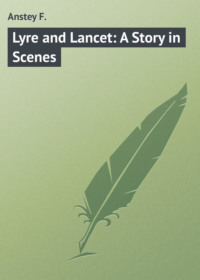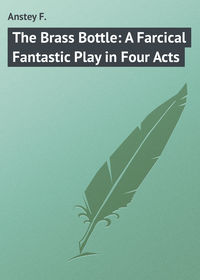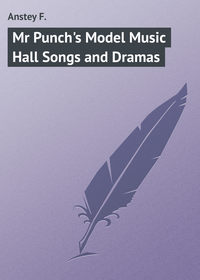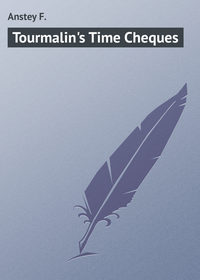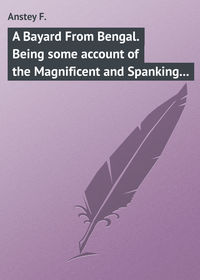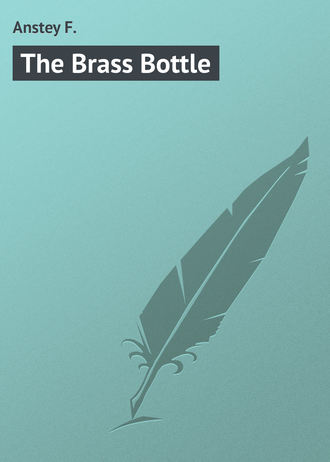 полная версия
полная версияThe Brass Bottle
"Now, don't say another word!" said the Lord Mayor. "Your costume is very nice – very nice indeed, and – and most appropriate, I am sure. But I see the City Marshal is waiting for us to head the procession. Shall we lead the way?"
The band struck up the March of the Priests from Athalie, and Horace, his head in a whirl, walked with his host, followed by the City Lands Committee, the Sheriffs, and other dignitaries, through the Art Gallery and into the Great Hall, where their entrance was heralded by a flourish of trumpets.
The Hall was crowded, and Ventimore found himself the object of a popular demonstration which would have filled him with joy and pride if he could only have felt that he had done anything whatever to justify it, for it was ridiculous to suppose that he had rendered himself a public benefactor by restoring a convicted Jinnee to freedom and society generally.
His only consolation was that the English are a race not given to effusiveness without very good reason, and that before the ceremony was over he would be enabled to gather what were the particular services which had excited such unbounded enthusiasm.
Meanwhile he stood there on the crimson-draped and flower-bedecked dais, bowing repeatedly, and trusting that he did not look so forlornly foolish as he felt. A long shaft of sunlight struck down between the Gothic rafters, and dappled the brown stone walls with patches of gold; the electric lights in the big hooped chandeliers showed pale and feeble against the subdued glow of the stained glass; the air was heavy with the scent of flowers and essences. Then there was a rustle of expectation in the audience, and a pause, in which it seemed to Horace that everybody on the dais was almost as nervous and at a loss what to do next as he was himself. He wished with all his soul that they would hurry the ceremony through, anyhow, and let him go.
At length the proceedings began by a sort of solemn affectation of having merely met there for the ordinary business of the day, which to Horace just then seemed childish in the extreme; it was resolved that "items 1 to 4 on the agenda need not be discussed," which brought them to item 5.
Item 5 was a resolution, read by the Town Clerk, that "the freedom of the City should be presented to Horace Ventimore, Esq., Citizen and Candlestick-maker" (which last Horace was not aware of being, but supposed vaguely that it had been somehow managed while he was at the buffet in the Library), "in recognition of his services" – the resolution ran, and Horace listened with all his ears – "especially in connection with …" It was most unfortunate – but at this precise point the official was seized with an attack of coughing, in which all was lost but the conclusion of the sentence, " … that have justly entitled him to the gratitude and admiration of his fellow-countrymen."
Then the six compurgators came forward and vouched for Ventimore's fitness to receive the freedom. He had painful doubts whether they altogether understood what a responsibility they were undertaking – but it was too late to warn them and he could only trust that they knew more of their business than he did.
After this the City Chamberlain read him an address, to which Horace listened in resigned bewilderment. The Chamberlain referred to the unanimity and enthusiasm with which the resolution had been carried, and said that it was his pleasing and honourable duty, as the mouthpiece of that ancient City, to address what he described with some inadequacy as "a few words" to one by adding whose name to their roll of freemen the Corporation honoured rather themselves than the recipient of their homage.
It was flattering, but to Horace's ear the phrases sounded excessive, almost fulsome – though, of course, that depended very much on what he had done, which he had still to ascertain. The orator proceeded to read him the "Illustrious List of London's Roll of Fame," a recital which made Horace shiver with apprehension. For what names they were! What glorious deeds they had performed! How was it possible that he – plain Horace Ventimore, a struggling architect who had missed his one great chance – could have achieved (especially without even being aware of it) anything that would not seem ludicrously insignificant by comparison?
He had a morbid fancy that the marble goddesses, or whoever they were, at the base of Nelson's monument opposite, were regarding him with stony disdain and indignation; that the statue of Wellington knew him for an arrant impostor, and averted his head with cold contempt; and that the effigy of Lord Mayor Beckford on the right of the dais would come to life and denounce him in another moment.
"Turning now to your own distinguished services," he suddenly heard the City Chamberlain resuming, "you are probably aware, sir, that it is customary on these occasions to mention specifically the particular merit which had been deemed worthy of civic recognition."
Horace was greatly relieved to hear it, for it struck him as a most sensible and, in his own particular case, essential formality.
"But, on the present occasion, sir," proceeded the speaker, "I feel, as all present must feel, that it would be unnecessary – nay, almost impertinent – were I to weary the public ear by a halting recapitulation of deeds with which it is already so appreciatively familiar." At this he was interrupted by deafening and long-continued applause, at the end of which he continued: "I have only therefore, to greet you in the name of the Corporation, and to offer you the right hand of fellowship as a Freeman, and Citizen, and Candlestick-maker of London."
As he shook hands he presented Horace with a copy of the Oath of Allegiance, intimating that he was to read it aloud. Naturally, Ventimore had not the least objection to swear to be good and true to our Sovereign Lady Queen Victoria, or to be obedient to the Lord Mayor, and warn him of any conspiracies against the Queen's peace which might chance to come under his observation; so he took the oath cheerfully enough, and hoped that this was really the end of the ceremony.
However, to his great chagrin and apprehension, the Lord Mayor rose with the evident intention of making a speech. He said that the conclusion of the City to bestow the highest honour in their gift upon Mr. Horace Ventimore had been – here he hesitated – somewhat hastily arrived at. Personally, he would have liked a longer time to prepare, to make the display less inadequate to, and worthier of, this exceptional occasion. He thought that was the general feeling. (It evidently was, judging from the loud and unanimous cheering). However, for reasons which – for reasons with which they were as well acquainted as himself, the notice had been short. The Corporation had yielded (as they always did, as it would always be their pride and pleasure to yield) to popular pressure which was practically irresistible, and had done the best they could in the limited – he might almost say the unprecedentedly limited – period allowed them. The proudest leaf in Mr. Ventimore's chaplet of laurels to-day was, he would venture to assert, the sight of the extraordinary enthusiasm and assemblage, not only in that noble hall, but in the thoroughfares of this mighty Metropolis. Under the circumstances, this was a marvellous tribute to the admiration and affection which Mr. Ventimore had succeeded in inspiring in the great heart of the people, rich and poor, high and low. He would not detain his hearers any longer; all that remained for him to do was to ask Mr. Ventimore's acceptance of a golden casket containing the roll of freedom, and he felt sure that their distinguished guest, before proceeding to inscribe his name on the register, would oblige them all by some account from his own lips of – of the events in which he had figured so prominently and so creditably.
Horace received the casket mechanically; there was a universal cry of "Speech!" from the audience, to which he replied by shaking his head in helpless deprecation – but in vain; he found himself irresistibly pressed towards the rail in front of the dais, and the roar of applause which greeted him saved him from all necessity of attempting to speak for nearly two minutes.
During that interval he had time to clear his brain and think what he had better do or say in his present unenviable dilemma. For some time past a suspicion had been growing in his mind, until it had now almost swollen into certainty. He felt that, before he compromised himself, or allowed his too generous entertainers to compromise themselves irretrievably, it was absolutely necessary to ascertain his real position, and, to do that, he must make some sort of speech. With this resolve, all his nervousness and embarrassment and indecision melted away; he faced the assembly coolly and gallantly, convinced that his best alternative now lay in perfect candour.
"My Lord Mayor, my lords, ladies, and gentlemen," he began, in a clear voice which penetrated to the farthest gallery and commanded instant attention. "If you expect to hear from me any description of what I've done to be received like this, I'm afraid you will be disappointed. For my own belief is that I've done nothing whatever."
There was a general outcry of "No, no!" at this, and a fervid murmur of protest.
"It's all very well to say 'No, no,'" said Horace, "and I am extremely grateful to you all for the interruption. Still, I can only repeat that I am absolutely unaware of having ever rendered my Country, or this great City, a single service deserving of the slightest acknowledgment. I wish I could feel I had – but the truth is that, if I have, the fact has entirely slipped from my memory."
Again there were murmurs, this time with a certain under-current of irritation; and he could hear the Lord Mayor behind him remarking to the City Chamberlain that this was not at all the kind of speech for the occasion.
"I know what you're thinking," said Horace. "You're thinking this is mock modesty on my part. But it's nothing of the sort. I don't know what I've done – but I presume you are all better informed. Because the Corporation wouldn't have given me that very charming casket – you wouldn't all of you be here like this – unless you were under a strong impression that I'd done something to deserve it." At this there was a fresh outburst of applause. "Just so," said Horace, calmly. "Well, now, will any of you be kind enough to tell me, in a few words, what you suppose I've done?"
There was a dead silence, in which every one looked at his or her neighbour and smiled feebly.
"My Lord Mayor," continued Horace, "I appeal to you to tell me and this distinguished assembly why on earth we're all here!"
The Lord Mayor rose. "I think it sufficient to say," he announced with dignity, "that the Corporation and myself were unanimously of opinion that this distinction should be awarded – for reasons which it is unnecessary and – hum – ha – invidious to enter into here."
"I am sorry," persisted Horace, "but I must press your lordship for those reasons. I have an object… Will the City Chamberlain oblige me, then?.. No? Well, then, the Town Clerk?.. No? – it's just as I suspected: none of you can give me your reasons, and shall I tell you why? Because there aren't any… Now, do bear with me for a moment. I'm quite aware this is very embarrassing for all of you – but remember that it's infinitely more awkward for me! I really cannot accept the freedom of the City under any suspicion of false pretences. It would be a poor reward for your hospitality, and base and unpatriotic into the bargain, to depreciate the value of so great a distinction by permitting it to be conferred unworthily. If, after you've heard what I am going to tell you, you still insist on my accepting such an honour, of course I will not be so ungracious as to refuse it. But I really don't feel that it would be right to inscribe my name on your Roll of Fame without some sort of explanation. If I did, I might, for anything I know, involuntarily be signing the death-warrant of the Corporation!"
There was a breathless hush upon this; the silence grew so intense that to borrow a slightly involved metaphor from a distinguished friend of the writer's, you might have picked up a pin in it! Horace leaned sideways against the rail in an easy attitude, so as to face the Lord Mayor, as well as a portion of his audience.
"Before I go any farther," he said, "will your lordship pardon me if I suggest that it might be as well to direct that all reporters present should immediately withdraw?"
The reporters' table was instantly in a stir of anger, and many of the guests expressed some dissatisfaction. "We, at least," said the Lord Mayor, rising, flushed with annoyance, "have no reason to dread publicity. I decline to make a hole-and-corner affair of this. I shall give no such orders."
"Very well," said Horace, when the chorus of approval had subsided. "My suggestion was made quite as much in the Corporation's interests as mine. I merely thought that, when you all clearly understood how grossly you've been deluded, you might prefer to have the details kept out of the newspapers if possible. But if you particularly want them published over the whole world, why, of course – "
An uproar followed here, under cover of which the Lord Mayor contrived to give orders to have the doors fastened till further directions.
"Don't make this more difficult and disagreeable for me than it is already!" said Horace, as soon as he could obtain a hearing again. "You don't suppose that I should have come here in this Tom-fool's dress, imposing myself on the hospitality of this great City, if I could have helped it! If you've been brought here under false pretences, so have I. If you've been made to look rather foolish, what is your situation to mine? The fact is, I am the victim of a headstrong force which I am utterly unable to control…"
Upon this a fresh uproar arose, and prevented him from continuing for some time. "I only ask for fair play and a patient hearing!" he pleaded. "Give me that, and I will undertake to restore you all to good humour before I have done."
They calmed down at this appeal, and he was able to proceed. "My case is simply this," he said. "A little time ago I happened to go to an auction and buy a large brass bottle…"
For some inexplicable reason his last words roused the audience to absolute frenzy; they would not hear anything about the brass bottle. Every time he attempted to mention it they howled him down, they hissed, they groaned, they shook their fists; the din was positively deafening.
Nor was the demonstration confined to the male portion of the assembly. One lady, indeed, who is a prominent leader in society, but whose name shall not be divulged here, was so carried away by her feelings as to hurl a heavy cut-glass bottle of smelling-salts at Horace's offending head. Fortunately for him, it missed him and only caught one of the officials (Horace was not in a mood to notice details very accurately, but he had a notion that it was the City Remembrancer) somewhere about the region of the watch-pocket.
"Will you hear me out?" Ventimore shouted. "I'm not trifling. I haven't told you yet what was inside the bottle. When I opened it, I found …"
He got no farther – for, as the words left his lips, he felt himself seized by the collar of his robe and lifted off his feet by an agency he was powerless to resist.
Up and up he was carried, past the great chandeliers, between the carved and gilded rafters, pursued by a universal shriek of dismay and horror. Down below he could see the throng of pale, upturned faces, and hear the wild screams and laughter of several ladies of great distinction in violent hysterics. And the next moment he was in the glass lantern, and the latticed panes gave way like tissue paper as he broke through into the open air, causing the pigeons on the roof to whirr up in a flutter of alarm.
Of course, he knew that it was the Jinnee who was abducting him in this sensational manner, and he was rather relieved than alarmed by Fakrash's summary proceeding, for he seemed, for once, to have hit upon the best way out of a situation that was rapidly becoming impossible.
CHAPTER XVII
HIGH WORDSOnce outside in the open air, the Jinnee "towered" like a pheasant shot through the breast, and Horace closed his eyes with a combined swing-switchback-and-Channel-passage sensation during a flight which apparently continued for hours, although in reality it probably did not occupy more than a very few seconds. His uneasiness was still further increased by his inability to guess where he was being taken to – for he felt instinctively that they were not travelling in the direction of home.
At last he felt himself set down on some hard, firm surface, and ventured to open his eyes once more. When he realised where he actually was, his knees gave way under him, and he was seized with a sudden giddiness that very nearly made him lose his balance. For he found himself standing on a sort of narrow ledge or cornice immediately under the ball at the top of St. Paul's.
Many feet beneath him spread the dull, leaden summit of the dome, its raised ridges stretching, like huge serpents over the curve, beyond which was a glimpse of the green roof of the nave and the two west towers, with their grey columns and urn-topped buttresses and gilded pineapples, which shone ruddily in the sun.
He had an impression of Ludgate Hill and Fleet Street as a deep, winding ravine, steeped in partial shadow; of long sierras of roofs and chimney-pots, showing their sharp outlines above mouse-coloured smoke-wreaths; of the broad, pearl-tinted river, with oily ripples and a golden glitter where the sunlight touched it; of the gleaming slope of mud under the wharves and warehouses on the Surrey side; of barges and steamers moored in black clusters; of a small tug fussing noisily down the river, leaving a broadening arrow-head in its wake.
Cautiously he moved round towards the east, where the houses formed a blurred mosaic of cream, slate, indigo, and dull reds and browns, above which slender rose-flushed spires and towers pierced the haze, stained in countless places by pillars of black, grey, and amber smoke, and lightened by plumes and jets of silvery steam, till all blended by imperceptible gradations into a sky of tenderest gold slashed with translucent blue.
It was a magnificent view, and none the less so because the indistinctness of all beyond a limited radius made the huge City seem not only mystical, but absolutely boundless in extent. But although Ventimore was distinctly conscious of all this, he was scarcely in a state to appreciate its grandeur just then. He was much too concerned with wondering why Fakrash had chosen to plant him up there in so insecure a position, and how he was ever to be rescued from it, since the Jinnee had apparently disappeared.
He was not far off, however, for presently Horace saw him stalk round the narrow cornice with an air of being perfectly at home on it.
"So there you are!" said Ventimore; "I thought you'd deserted me again. What have you brought me up here for?"
"Because I desired to have speech with thee in private," replied the Jinnee.
"We're not likely to be intruded on here, certainly," said Horace. "But isn't it rather exposed, rather public? If we're seen up here, you know, it will cause a decided sensation."
"I have laid a spell on all below that they should not raise their eyes. Be seated, therefore, and hear my words."
Horace lowered himself carefully to a sitting position, so that his legs dangled in space, and Fakrash took a seat by his side. "O, most indiscreet of mankind!" he began, in an aggrieved tone; "thou hast been near the committal of a great blunder, and doing ill to thyself and to me!"
"Well, I do like that!" retorted Horace; "when you let me in for all that freedom of the City business, and then sneaked off, leaving me to get out of it the best way I could, and only came back just as I was about to explain matters, and carried me up through the roof like a sack of flour. Do you consider that tactful on your part?"
"Thou hadst drunk wine and permitted it to creep as far as the place of secrets."
"Only one glass," said Horace; "and I wanted it, I can assure you. I was obliged to make a speech to them, and, thanks to you, I was in such a hole that I saw nothing for it but to tell the truth."
"Veracity, as thou wilt learn," answered the Jinnee, "is not invariably the Ship of Safety. Thou wert about to betray the benefactor who procured for thee such glory and honour as might well cause the gall-bladder of lions to burst with envy!"
"If any lion with the least sense of humour could have witnessed the proceedings," said Ventimore, "he might have burst with laughter – certainly not envy. Good Lord! Fakrash," he cried, in his indignation, "I've never felt such an absolute ass in my whole life! If nothing would satisfy you but my receiving the freedom of the City, you might at least have contrived some decent excuse for it! But you left out the only point there was in the whole thing – and all for what?"
"What doth it signify why the whole populace should come forth to acclaim thee and do thee honour, so long as they did so?" said Fakrash, sullenly. "For the report of thy fame would reach Bedeea-el-Jemal."
"That's just where you're mistaken," said Horace. "If you had not been in too desperate a hurry to make a few inquiries, you would have found out that you were taking all this trouble for nothing."
"How sayest thou?"
"Well, you would have discovered that the Princess is spared all temptation to marry beneath her by the fact that she became the bride of somebody else about thirty centuries ago. She married a mortal, one Seyf-el-Mulook, a King's son, and they've both been dead a considerable time – another obstacle to your plans."
"It is a lie," declared Fakrash.
"If you will take me back to Vincent Square, I shall be happy to show you the evidence in your national records," said Horace. "And you may be glad to know that your old enemy, Mr. Jarjarees, came to a violent end, after a very sporting encounter with a King's daughter, who, though proficient in advanced magic, unfortunately perished herself, poor lady, in the final round."
"I had intended thee to accomplish his downfall," said Fakrash.
"I know," said Horace. "It was most thoughtful of you. But I doubt if I should have done it half as well – and it would have probably cost me an eye, at the very least. It's better as it is."
"And how long hast thou known of these things?"
"Only since last night."
"Since last night? And thou didst not unfold them unto me till this instant?"
"I've had such a busy morning, you see," explained Horace. "There's been no time."
"Silly-bearded fool that I was to bring this misbegotten dog into the august presence of the great Lord Mayor himself (on whom be peace!)," cried the Jinnee.
"I object to being referred to as a misbegotten dog," said Horace, "but with the rest of your remark I entirely concur. I'm afraid the Lord Mayor is very far from being at peace just now." He pointed to the steep roof of the Guildhall, with its dormers and fretted pinnacles, and the slender lantern through which he had so lately made his inglorious exit. "There's the devil of a row going on under that lantern just now, Mr. Fakrash, you may depend upon that. They've locked the doors till they can decide what to do next – which will take them some time. And it's all your fault!"
"It was thy doing. Why didst thou dare to inform the Lord Mayor that he was deceived?"
"Why? Because I thought he ought to know. Because I was bound, particularly after my oath of allegiance, to warn him of any conspiracy against him. Because I was in such a hat. He'll understand all that – he won't blame me for this business."
"It is fortunate," observed the Jinnee, "that I flew away with thee before thou couldst pronounce my name."
"You gave yourself away," said Horace. "They all saw you, you know. You weren't flying so particularly fast. They'll recognise you again. If you will carry off a man from under the Lord Mayor's very nose, and shoot up through the roof like a rocket with him, you can't expect to escape some notice. You see, you happen to be the only unbottled Jinnee in this City."




